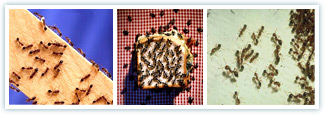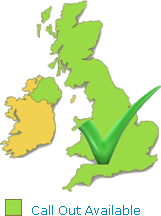-
Ant Removal
Pest Control – Ants
To get your free ant removal quote click here.-

Ants may be small, but they sure are clever and working together they can achieve amazing things. Signs that there may be ants inhabiting your property include identifying ant pathways coming in and out of your house or small piles of earth and ground, which may indicate nesting sites.
The presence of ants on your premises can infest and contaminate your food and clean areas. They are not well liked but they are relatively harmless and can usually be controlled fairly easily.
To identify the species of ant invading your home, or business premises, you really need to get advice from professional pest controllers. There are over 15,000 different species of ant around the world, although only 40 are well known in the United Kingdom. You should ant-proof access points in your garden and arrange for professionally qualified experts to make regular inspections after an infestation has been eradicated to ensure they do not return.
The Black Ant and the Pharaoh Ant are the two most common types to be found invading our homes. Black ants nest outside but are commonly found within houses on their hunt for food, they prefer sweet, sugary foods such as jam. As well as human food, ants also prey on greenfly and blackfly and other small garden insects. . They are more of a nuisance than a health risk because they do not transmit any diseases, but they do travel through unhygienic places and as such they can quickly contaminate food with their germs.

Ants traditionally built their nests around plant roots but they are increasingly being found in the cavity walls of properties. Although ants are generally disliked, they are quite important within their natural surroundings. They aerate soil, break down organic matter and assist in controlling the population of other insects.
Ants establish colonies in order to work together and get tasks done. They send out ant scouts to find food and water resources and these scouts leave a scented trail which allows them to easily find their way back to their colony with news of the resources they have found. They then get other colony members to come with them to retrieve the food and water.
If you want to get rid of ants you need to destroy their scent trails, eliminate their chances at finding food sources and seal off the entrances to your home that they may use to gain access.
In order to destroy the scent trails effectively you should use soapy water and carefully scrub down the entire area from where they found food right back to their colony, if you can trace it.
The use of Vaseline, chilli powder, cinnamon, diatomaceous earth and boric acid are all items people have used to deter ants from entering their homes and they’ve all been reported to work well on a temporary basis. A more permanent solution is to caulk cracks, holes and crevices where the ants may crawl through.
Because ants are so tiny they can squeeze their way into even the smallest of gaps in a bid to get at a newfound source of food. All your opened food should be kept in tightly shut container and jars.
Ants appear in hot weather and don’t like the cold so Ants don’t tend to enter your refrigerator, therefore your food will also be safe in there. You should always wipe down all surfaces such as worktops, tables and floors on a daily basis. Hygiene is the best ant deterrent and regularly cleaning out your cupboards, washing away stains and crumbs will certainly help eliminate their food sources. A tiny crumb to us will be a very satisfying meal to an ant colony.
Ants will eat anything and pet food can be a particular favourite. In order to deter them you should put your pet’s food bowl within another bowl of soapy water, which will create a moat around the bowl that ants will crawl into and trap them.
A garden product that Ants thrive on is the honeydew which is created by certain insects. If you can control insects that produce honeydew and choose plants that do not attract these insects then you will again reduce the ant colony’s food supply.
Baits can have both a positive and negative effect on eradicating ant colonies. Ant bait contains something that tastes good to ants so they are very attracted to it and the ant scouts will send for their colony to sample it. The ant bait also contains poison so it kills them off. However, because it is particularly tasty bait for ants, they can end up being lured from miles around, so instead of just eradicating the colony which originally entered your home, you will have inadvertently attracted many more colonies to visit your home. Baits are best used in the path of an ant trail and removed fairly promptly after the ant activity ends.
Sticky barrier traps are a very popular deterrent to stop ants from climbing trees and plants. The queen is in charge of an ant colony and she is the only one to reproduce. The rest of the colony is made up of scouts (also known as workers), infertile females and males. They have slightly different features from one another and differing roles within their colony.
Ants mate using their wings and breed during flight. Males die very quickly after mating and the queen then sets up a new colony in her chosen spot. The queen hibernates through the winter months and lays her eggs in spring.
If you discover an ant’s nest near your home you should pour boiling water into it. Ants can survive in water but boiling water will kill them. This is not a terribly effective method though and you are advised to contact pest control experts to fully eradicate the ants with the use of specially formulated chemicals.
-
Call Me Back Now

- Area Covered

 See All Locations
See All Locations